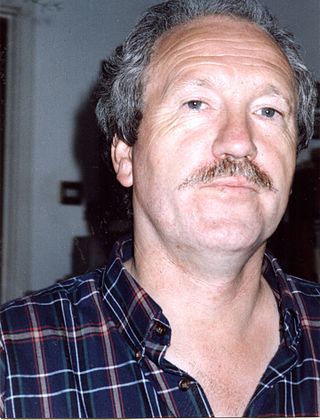Related Research Articles
Socialist Organiser was a weekly socialist newspaper circulated in the Labour Party. The newspaper was founded in 1979 by the Socialist Campaign for a Labour Victory, later renamed the Socialist Organiser Alliance.
Alan Thornett is a British Trotskyist.
The Workers Internationalist League was a Trotskyist group in Britain founded in the summer of 1983 by the Internationalist Faction of the Workers Socialist League. It was the British affiliate of the Trotskyist International Liaison Committee until that body was renamed the International Trotskyist Committee.
James Robertson (1928–2019) was the long-time and founding National Chairman of the Spartacist League (US), the original national section of the International Communist League. In his later years, Robertson was consultative member of the ICL's international executive committee.
The Socialist Labour Group was a Trotskyist group in Britain between 1979 and 1989.
The Spartacist League of Britain is a Trotskyist political organisation in Britain. It is the British section of the International Communist League.
Under a variety of names and within a number of organizations over at least 17 years, the group around Harry Turner, or Turnerites was a presence within Trotskyism in the United States.
The Spartacist League is a Trotskyist political grouping which is the United States section of the International Communist League, formerly the International Spartacist Tendency. This Spartacist League named themselves after the original Spartacus League of Weimar Republic in Germany, but has no formal descent from it. The League self-identifies as a "revolutionary communist" organization.
The International Socialist Group (ISG) was a Trotskyist organisation in Britain. It was the British section of the Fourth International (FI) until 2009 when it dissolved into Socialist Resistance.
The International Committee of the Fourth International (ICFI) is a public faction of the Fourth International founded in 1953. Today two Trotskyist internationals claim to be the continuations of the ICFI; one with sections named Socialist Equality Party which publishes the World Socialist Web Site, and another linked to the Workers Revolutionary Party in the UK.

Thomas Gerard Healy was an Irish-born British political activist, a co-founder of the International Committee of the Fourth International and the leader of the Socialist Labour League and later the Workers Revolutionary Party.
The International Marxist Group (IMG) was a Trotskyist group in Britain between 1968 and 1982. It was the British Section of the Fourth International. It had around 1,000 members and supporters in the late 1970s. In 1980, it had 682 members; by 1982, when it changed its name to the Socialist League, membership had fallen to 534.

The Fourth International (FI), founded in 1938, is a Trotskyist international. In 1963, following a ten-year schism, the majorities of the two public factions of the Fourth International, the International Secretariat (ISFI) and the International Committee (ICFI), reunited, electing a United Secretariat of the Fourth International.

The International Communist League (Fourth Internationalist) abbreviated as ICL(FI), earlier known as the international Spartacist tendency (iSt) is a Trotskyist international. Its largest constituent party is the Spartacist League (US). There are smaller sections of the ICL (FI) in Mexico, Canada, France, Germany, Ireland, Italy, Japan, South Africa, Australia, Greece and the United Kingdom.
The Workers Revolutionary Party (WRP) is a Trotskyist group in Britain once led by Gerry Healy. In the mid-1980s, it split into several smaller groups, one of which retains possession of the name.
The Workers' International League (WIL) was a British Trotskyist organisation that split in early 1987 from the Workers' Revolutionary Party (WRP) which had been led by Sheila Torrance.
The Alliance for Workers' Liberty (AWL), also known as Workers' Liberty, is a Trotskyist group in Britain and Australia, which has been identified with the theorist Sean Matgamna throughout its history. It publishes the newspaper Solidarity.

Sean Matgamna is an Irish Trotskyist active in Britain. A founder of Workers' Fight in 1966, he is still a prominent member of the group, now called the Alliance for Workers' Liberty.
Orthodox Trotskyism is a branch of Trotskyism which aims to adhere more closely to the philosophy, methods and positions of Leon Trotsky and the early Fourth International, Vladimir Lenin and Karl Marx than other avowed Trotskyists.